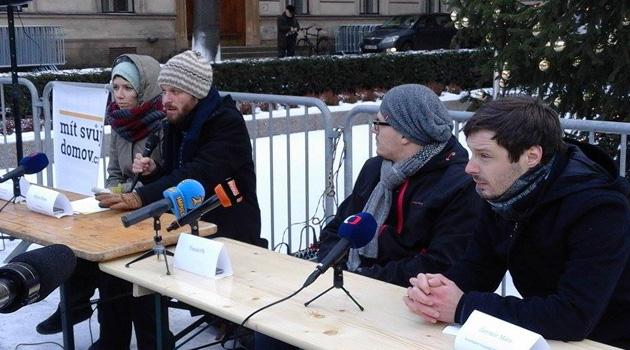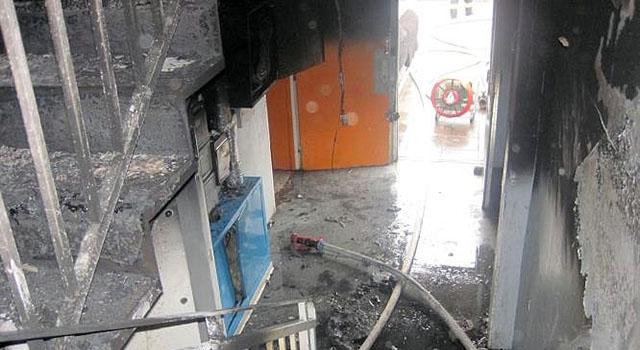Czech Govt to build 55 000 "cells" for the poor, Platform for Social Housing says thousands of new ghettos will result

According to a new proposal from the Czech Regional Development Ministry, the Czech Government wants to build a new type of accommodation for the country’s impoverished inhabitants, so-called “social homes”. There could be as many as 55 000 “cells” involved.
Experts and some MPs have objected to the idea, alleging that the state would create thousands of ghettos if it executes the plan. According to experts from the Platform for Social Housing, this would be segregated accommodations of the “container” type in new state-supported residential hotels.
The Platform has presented its “10 Prerequisites for Addressing the Housing Crisis” as an alternative to the proposal. Emil Jíra, a former tenant of more than one residential hotel who represents the Association of People for Homes, which brings together people experienced in the housing crisis, commented on the ministry’s proposal as follows: “My wife and I were living in an apartment of the kind that is commonly rented here. We divorced, and then there was a serious accident, and I had to move into a residential hotel. From my own experience I know that facilities of this type do not make it possible for people to rejoin normal life in society. In the residential hotels the conditions are unnatural, people lose the ability to communicate, they lose the habits that are naturally part of normal life. A segregated environment is created that does not make it possible for them to find a job.”
The certainty of renting accommodation for a standard price is lacking for roughly 200 00 Czechs, 20 000 of whom are children. After the law on social housing was not adopted during the previous administration of Czech PM Bohuslav Sobotka, the Czech Regional Development Ministry has now brought forward this new proposal.
The current proposal counts on building as many as 55 000 “cells” in new so-called “social homes”, i.e., state-supported residential hotels. The “social homes” are mentioned in the background materials for the explanatory memorandum to the new law on social housing.
Jiří Klíma, director of the Department of Housing Policy at the Regional Development Ministry, has confirmed that fact to the Platform. Experts and organizations working with homeless people associated in the Platform for Social Housing, representatives of the Association of People for Homes, which brings together people experienced in the housing crisis, Czech MP Olga Richterová (Pirates), Czech MP Kateřina Valachová (Czech Social Democratic Party – ČSSD) and Czech MP Jan Čižinský (Christian Democrats – KDU-ČSL), who is also the Mayor of the Prague 7 Municipal Department, have objected to the building of “social homes” that would concentrate impoverished people in a single location.
“The residential hotels are not a solution to the housing crisis, they are the cause of it. It makes no sense for the state to build residential hotels. Those facilities concentrate poverty and social exclusion geographically. The state will be using taxpayers’ money to construct thousands of new ghettos,” said the chair of the Platform, Štěpán Ripka.
The bill must be adjusted, Ripka believes, because the existing proposal contravenes the good experiences of municipalities and the Government’s own program declaration, which has pledged to reduce the number of people without housing as per the recommendations of the most recent report of the Supreme Audit Office and experts. On 28 March the Platform presented its “10 Prerequisites for Addressing the Housing Crisis”.
“At the administrative meeting we will ask Minister Dostálová to reassess the bill drafted by her employees. We believe that we, together with the ministry, the towns that are involved in good practice, and the experts, all have a common interest in designing a law that will actually reduce the number of people living with a housing shortage,” Ripka said.
Czech MP Olga Richterová (Pirates) disagrees with the ministry’s intention to build state-run residential hotels: “We need a long-term solution that will lead families with young children, for example, out of the vicious circle of residential hotels, poor school attendance, and difficulties with holding a job. Experience demonstrates that the most certain kind of aid to provide is a combination of accommodation in standard apartments located in regular buildings and intensive social work with the tenants. Building ‘social homes’ is the most expensive, least effective solution and is not based on any expert experience. I will ask about this at the beginning of April at a meeting with the relevant deputy minister. At the same time, we must not forget about affordable housing in general, e.g., keeping apartment units under the ownership of municipalities.”
Czech MP Kateřina Valachová (Czech Social Democratic Party – ČSSD) expressed her view of the bill as follows: “Building ghettos solves nothing, we must go in a different direction, one that is more complex, but one that is the right way. Actual aid and respect for the housing needs of young families, single senior citizens, and people who have ended up in difficult life situations must await us at the end of the road.”
“I am startled by how the Platform for Social Housing has chosen to communicate. Whenever they asked to meet I received them personally, and naturally they are also invited to the negotiations of all partners,” Regional Development Minister Dostálová told the Czech daily Právo.
“Social homes will not be designed for long-term or permanent accommodation but will be a precursor for access to social apartments that will be absolutely classic rental units,” Vilém Frček, spokesperson for the ministry, told Právo. The ministry does not believe there is a danger of ghettos arising from the construction of the “social homes”.
“The municipality will be obligated to uphold the principles limiting the creation of spatially excluded, segregated localities, just as they are obligated to do when building social apartments supported from European funds,” the spokesperson said. The maximum number of units per “special home” would be limited, the spokesperson also claimed.
The number of people experiencing housing shortage in the Czech Republic has risen sharply since 2010. Just a few municipalities in the country are an exception to this rule.
Brno, Liberec, and the Prague 7 Municipal Department have managed to avoid this and collaborate in the Partnership for Ending Homelessness. “In Prague 7 we are doing our best to address the housing shortage despite certain limits, such as the fact that the number of apartment units owned by the municipality is small. Most municipalities must grapple with such a situation. The state could aid us, but the current proposal from the ministry does not represent assistance. It will bring about more bad outcomes than good ones. In order to help people in our Municipal Department, we do not offer them residential hotels, but affordable municipally-owned units. Already now in Prague 7 there are no families with minor children in any residential hotels. We hope the ministry will abandon its intention to build more residential hotels. We would not appreciate this kind of ministration from the state. I hope other entities and expert associations become involved in the process of designing the law and that the process will be transparent,” Czech MP Jan Čižinský, the Mayor of Prague 7, said.
The legislation is scheduled for submission to the Chamber of Deputies for adoption by the end of 2019 at the very latest. In addition to setting a timetable it will be necessary to establish binding deadlines for increasing the housing stock in accordance with the law, should it be adopted.
